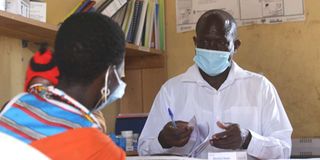Nurse, doctor, lab techie, pharmacist and counsellor

Lerata Dispensary nursing officer Francis Lenkupae attends to a patient at the dispensary in Samburu County on August 19, 2020.
What you need to know:
- Using his mobile phone’s torch to light the way, Mr Lenkupae dashed out of his manyatta to the dispensary.
- Most women in the area prefer giving birth at home, rather than walk tens of kilometres to the health facility, braving wild animals on the way.
He runs all healthcare services, including immunisation, family planning, record-keeping, antenatal clinic, HIV or TB clinics and dispensation of drugs.
When Francis Lenkupae, a nurse in Samburu County, was transferred to Lerata Dispensary two years ago, he did not know how his life would change.But he knew he was going to a remote area — some 340 kilometres from the county headquarters, Maralal town.
On arriving at the facility, he learnt that he would be the only medical worker, serving 3,000 people.
At Lerata, Mr Lenkupae is everything: nurse, pharmacist, doctor, Covid-19 lab technician and counsellor.
He says that working in a remote area with no proper roads, no mobile phone network and no ambulance is very challenging.
One day last year, in the middle of the night, while he was asleep, the watchman woke him.
“The baby is coming,” he said with urgency, “nurse, hurry up!”
Using his mobile phone’s torch to light the way, Mr Lenkupae dashed out of his manyatta to the dispensary. On arrival, he found a pregnant 15-year-old writhing in pain on the verandah. She was 25 weeks pregnant, so she was not in normal labour. He learnt that she had walked 30 kilometres to the dispensary to seek medical help, arriving in the middle of the night to find a deserted, dark building.
With only 18 per cent power on the mobile phone, the nurse knew he had to work fast.
Develop complications
“I prayed that she would not develop complications. The nearest health facility is Wamba Catholic Mission Hospital, about 150 kilometres away and, with the bad roads and no means of transport, I would have lost the patient,” he says.
The girl was in labour for the next three hours, by which time the power on the phone was at five per cent. She delivered the premature baby a few minutes to 6am.
“Her eyes were fused shut; her skin was so fragile that touching her made it peel. She was bruised from the delivery and her weight was that of a loaf of bread,” recalls Mr Lenkupae.
There was neither incubator nor ventilator and the baby was developing breathing complications, as her lungs were not fully formed. The odds were stacked up against her.
“I knew she was not going to make it, and she lived for only two days. I thank God I saved the life of the mother. Had she delivered at home, we would have lost both the baby and the mother,” says Mr Lenkupae.
Most women in the area prefer giving birth at home, rather than walk tens of kilometres to the health facility, braving wild animals on the way.
“I kept thinking about this mother. That was an amazing point in my career and it made me realise that nursing was for me,” he says.
Medical emergencies
This is just one of the many medical emergencies that healthcare workers in remote areas face every day.
He runs all healthcare services, including immunisation, family planning, record-keeping, antenatal clinic, HIV or TB clinics and dispensation of drugs.
The lack of a mobile service network makes communication very hard.
“I wish we had mobile network and even a means of transport so I can move around the community. I would arrest some of the complications before they worsen,” he says.
The only time Mr Lenkupae, 47, can be found on phone is Saturday and Sunday, when he joins his family in Wamba. When he is gone, the dispensary is closed and the patients have to wait until he returns.
“They know that we don’t work on Saturdays and Sundays. I feel bad that I have to lock the dispensary, but I to see my family,” he says.
With this routine, it is impossible for Mr Lenkupae to take leave. Many a time, he has had to make tough choices between taking a rest and service to his people.
Additional staff
He opens the dispensary door at 8am and closes it when the last patient leaves.
“In a day, I attend to about 35 people. My life revolves around my patients,” he says.
For the two years he has been at Lerata, he has been pushing for the county to hire additional staff.
County Health executive Stephen Lekupe says the government is working towards this goal amid a shortage of the healthcare workers.
“We will be posting a nurse to the facility soon to help Lenkupae. He has done a commendable job for the community,” says Dr Lekupe.
What troubles Mr Lenkupae now is the Covid-19 pandemic. He is yet to receive any protective equipment from the county government. However, he wears a surgical mask and gloves while attending to patients.
Since the first Covid-19 infection was reported in Kenya in March, he has attended to 166 patients with respiratory infections, 27 with pneumonia and 13 with diarrhoea.
“Some of them could be asymptomatic and without proper protection, I am afraid we could get infected,” he said.
It doesn’t help that the local perception about the virus is that it only infects those living in urban areas.
As a way to curb the spread of the virus, the dispensary has installed a hand-washing station and frequently reminds patients to keep social distance as they await treatment.
Samburu County has recorded 43 Covid-19 cases.
“I am praying that we don’t record any case at the dispensary, we have nothing to protect ourselves,” said Mr Lenkupae.





